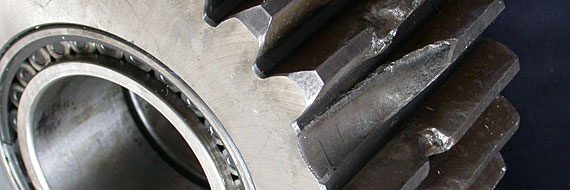Materials & Failure Analysis
Laboratories for destructive and non-destructive testing
The LA laboratory facilities range from a test workshop with the capacity to handle test items up to three tonnes in weight to fully-equipped destructive testing facilities, metallographic capacities, scanning electron microscopy and x-ray microanalysis. LA works for companies from the steel, automotive, construction and maritime industries.
Failure analysis
In cases of damage, a conclusive failure evaluation and identification of the primary cause is necessary. The root cause is to be found through a holistic view on the complex interaction between relevant parameters relating to design, production and operation. A laboratory analysis provides valuable help in determining the cause. After all, the damaged component itself provides the only objective record of how the damage occurred, and the information it contains can be coaxed out by applying suitable material examination methods.
Destructive testing
LA offers tensile tests with and without microstrain measurement, hot tensile testing at temperatures up to 1,000 °C and notched bar impact testing at temperatures down to -196 °C. We initiate macro-hardness tests on materials and welded joints, in line with Rockwell, Brinell and Vickers’ standards. Furthermore, LA provides low load-hardness measurements and offers bend tests, ring flattening, flaring, expanding and tensile tests as well as weld bead bend tests and cupping tests.
Metallography
Irregularities in the microstructure of a material caused by manufacturing or processing faults can lead to the failure of single components or even entire systems. LA analyses the grain structure and the heat treatment condition, the degree of purity and the grain size, coating and surface characteristics, the seam geometry of welded joints and welding imperfections.
Chemical analysis
Our optical vacuum emission spectrometer offers simultaneous measurement with integrated process computers and 34 analysis channels, giving you precise analyses of low-, medium- and high-alloy steels, non-ferrous metals and cast iron.
Corrosion
We test your materials to international standards for resistance to inter-crystalline corrosion in the active/passive transition and in the trans-passive zone, as well as for resistance to hydrogen embrittlement. LA conducts ferric sulphate and sulphuric acid tests, and the Strauss, Huey and HIC tests.
Non-destructive testing
Our specialists, qualified up to Level 3 according to EN 473, conduct endoscopy, ultrasonic testing of rolled, cast and forged products as well as of welded joints using the pulse echo method, magnetic particle inspections using the stray flux method, dye-penetrant testing, and wall and layer thickness testing by magnetic induction. We check dimensions and surfaces and provide ambulant metallography, hardness testing and spectrometry.
